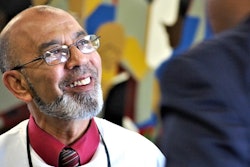If your campus is green energy-wise but you’re still buying all-beef hamburgers and the like in the school cafeteria, your school isn’t green enough.
In the 60s, they burned bras and draft cards. American schools should start burning burgers leading to an outright ban of beef on campus like they’re doing at Goldsmiths college of the University of London.
 Emil Guillermo
Emil GuillermoIt’s even more important if you’re a person of color at an American college or university.
Make no mistake – besides being a legit climate-change issue, banning beef and meat products on our campuses is a legit diversity issue. Diversity doesn’t just apply to race, you know. You should be thinking about the animals and the plight of other species. They deserve the chance to live out their lives, too.
If it’s never occurred to you, take some time to understand how all our lives and rights have been intertwined from the past to the present.
When you think about enslaved humans, or those of us from people who have been colonized and turned into a labor force, think about how often they were referred to in a derogatory way.
No better than animals? Equal to animals?
My father was called “monkey” when he came to America.
But it took his son to develop a compassion not just for the monkeys but for all animals. I make sure they don’t make it to my plate.
In that sense, not eating animals is a fundamental diversity issue. Respect for all.
And if you still have a hard time making that leap, then start selfishly.
Think of what all that animal fat in meat is doing to your health.
Got diabetes? You will.
According to the American Diabetes Association, African-Americans, Mexican Americans, American Indians and Asian Americans are some of the ethnic groups who are at a higher risk of developing Type-2 Diabetes.
Here are some scary diversity numbers from the Diabetes Council website:
· About 4.9 million African-American adults (18.7 percent) 20 years of age and above have diagnosed or undiagnosed diabetes compared to 7.1 percent of White Americans.
· African-Americans are at 77 percent higher risk of getting diabetes than White Americans.
· About 11.8 percent of Latino/Hispanic Americans 20 years of age and above have diagnosed diabetes and are at 66 percent higher risk of getting diabetes than White Americans.
· The fifth-leading cause of death for Asian Americans is diabetes.
· American Indians are at 3.5 times higher risk of diabetes-related kidney failure than the rest of the U.S.
What’s meat got to do with it? Plenty.
Studies from the Harvard School of Public Health have linked excessive red meat consumption to increased instances of Type 2 diabetes.
Dr. Frank Hu, professor of epidemiology and nutrition at Harvard, found that eating three and one-half servings or more each week of red meat raised the chance of developing Type 2 diabetes by 50 percent within four years.
Conversely, the study found that after a 10-year follow up, those decreasing their meat consumption lowered their diabetes risk by 14 percent.
That’s good reason not to eat meat, especially if you’re a person of color. You’ll flat out live longer.
So rest assured, the selfish argument is always there if ever you find yourself unconvinced by melting ice sheets and ravaged forest fires that climate change is for real.
If we keep going the way we are, the meat won’t get a chance to kill you. Not if the earth dies first.
Better to do something about it, right?
Goldsmiths has the right idea. It’s banned beef from university cafes starting in September. And they’re adding a tax on bottled water and plastic cups, too.
The college started with burgers, and next will address switching to a clean energy supplier.
But don’t discount what banning beef burgers does.
Oxford University scientists say avoiding meat and dairy is the single biggest thing you can do to fight climate change.
Going vegetarian would cut food-related emissions by 63 percent; going vegan (no meat or dairy) would reduce emissions by 70 percent.
Besides Goldsmiths, other colleges in England have begun the trend. In the U.S., schools have tackled the green energy issue, but as we see, that’s just a shade of green and hardly green enough.
Time to go all the way. We’re running out of time.
When is your campus banning burgers?
Emil Guillermo is a journalist and commentator. He writes for the Asian American Legal Defense and Education Fund, is an adjunct professor at San Francisco State University and hosts “The PETA Podcast.” You can follow him on Twitter @emilamok






















